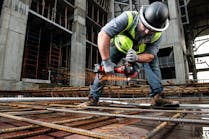The “State of the American Utility Construction Industry” survey conducted last week by the National Utility Contractors Association (NUCA) of their membership found that 97 percent of its member’s work this month was considered essential by their state and local authorities during the Covid-19 pandemic.
In almost equal amounts, the NUCA member respondents said their work backlog is remaining constant (44 percent) or rolling with work stoppages (41 percent). The remaining 14 percent of members indicated their job site work had dramatically slowed down, bids were reduced to a trickle, or they had experienced large cancellations of private contracts.
“These results clearly show that for the U.S. utility construction industry, we are doing our part to keep America working. That’s what an essential industry does for its community,” said Doug Carlson, NUCA's CEO. “Our member employees do their best to practice social distancing on job sites. They wear durable PPE as part of their normal approach to safety at the workplace, including masks, gloves, and helmets. But the survey results also show that our industry continues to seek short-term financial relief to retain their employees and not lay them off.”
NUCA members are concerned about their business cash flow. Sixty-one percent of survey respondents said they had filed for a Small Business Administration loan, but as of the date when the survey closed (April 23), 55 percent said they had not received their loan funds, with only 34 percent having received their Paycheck Protection Program funds.
About two-thirds of industry applicants had applied through their local bank, with only one-third through a national bank branch, and less than one percent through a credit union.
The survey also asked NUCA members what kind of essential work was being completed during this emergency period. Twenty-six percent said they were working on water projects, 26 percent indicated wastewater projects, 5 percent electric projects, and 4 percent on telecommunication projects.
Thirty-eight percent indicated they were working on varied projects such as highway infrastructure repairs, municipal public works construction, emergency repairs on homes, gas line repairs, or ancillary business functions to keep these essential projects supplied with equipment or materials.
Source: NUCA





